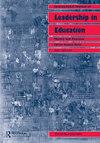The effect of servant leadership on Greek public secondary schools acting as learning organizations
IF 2.5
Q1 EDUCATION & EDUCATIONAL RESEARCH
International Journal of Leadership in Education
Pub Date : 2023-10-02
DOI:10.1080/13603124.2023.2264261
引用次数: 0
Abstract
ABSTRACTThis study aims to explore the effect of servant leadership on Greek public secondary schools operating as learning organizations. Over 192 public school principals completed both the servant leadership questionnaire (SLQ) and the dimensions of learning organization questionnaire (DLOG). A quantitative survey was conducted all over the country. From a practical standpoint, servant leadership seems not to be impractical as it is exercised to a moderate degree. Schools act as learning organizations to a moderate to strong degree. The results of the multilevel analysis emphasize the importance of empowerment, emotional healing and creating value for the community as major predictors of establishing a school-based organizational learning culture. Furthermore, employment status, teacher qualifications and school size have a significant impact on the perceived learning organization culture. Findings are expected to encourage managers to embrace and adopt the doctrine of servant leadership as a whole to improve long-term performance. Disclosure statementNo potential conflict of interest was reported by the author(s).Additional informationNotes on contributorsAthanasios TsarkosAthanasios Tsarkos is a classroom teacher in secondary education as a physicist at Zipari high school, Κos island, Dodekanisa, 85300, GREECE. Email: atsarkos@sch.gr. His current research interests include the development and application of servant leadership, pedagogies and organizational learning and wisdom in public secondary education.服务型领导对希腊公立中学学习型组织的影响
摘要本研究旨在探讨服务型领导对希腊公立中学学习型组织的影响。192名公立学校校长分别填写了服务型领导问卷(SLQ)和学习型组织问卷(DLOG)。在全国范围内进行了定量调查。从实际的角度来看,仆人式领导似乎不是不切实际的,因为它在适度的程度上得到了运用。学校扮演学习型组织的角色,从中等到强烈。多层次分析的结果强调了授权、情感治疗和为社区创造价值作为建立基于学校的组织学习文化的主要预测因素的重要性。此外,就业状况、教师资格和学校规模对感知学习型组织文化有显著影响。研究结果有望鼓励管理者全盘接受和采用仆人式领导理论,以提高长期绩效。披露声明作者未报告潜在的利益冲突。作者简介:sathanasios Tsarkos是Zipari高中(Κos island, Dodekanisa, 85300, GREECE)的一名中学教师,也是一名物理学家。电子邮件:atsarkos@sch.gr。他目前的研究兴趣包括公仆式领导的发展与应用、教育学、组织学习与智慧在公立中学教育中的应用。
本文章由计算机程序翻译,如有差异,请以英文原文为准。
求助全文
约1分钟内获得全文
求助全文
来源期刊

International Journal of Leadership in Education
EDUCATION & EDUCATIONAL RESEARCH-
CiteScore
5.10
自引率
14.30%
发文量
65
期刊介绍:
International Journal of Leadership in Education: Theory & Practice is an international journal for the publication of theoretical and practical discussions of educational leadership. The Journal presents: •cutting-edge writing on educational leadership, including instructional supervision, curriculum and teaching development, staff development, educational administration and more; •an alternative voice: reports of alternative theoretical perspectives, alternative methodologies, and alternative experiences of leadership; •a broad definition of leadership, including teachers-as-leaders, shared governance, site-based decision making, and community-school collaborations.
 求助内容:
求助内容: 应助结果提醒方式:
应助结果提醒方式:


